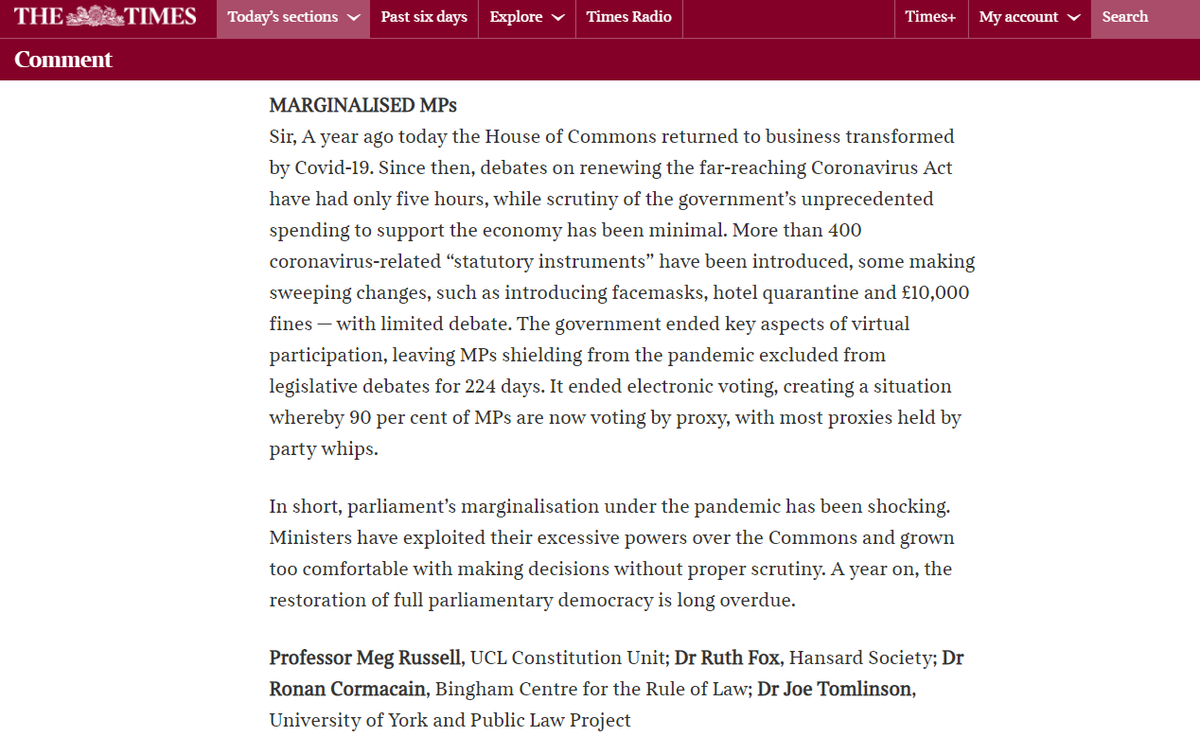
1/
Parliament’s power must be restored after ‘shocking’ marginalisation by government, warns Unit Director & @UKandEU Fellow Meg Russell in a joint briefing with @RuthFox01 @HansardSociety, @JoePTomlinson @publiclawprojct & Ronan Cormacain @BinghamCentre
bit.ly/2QIlhSS
Parliament’s power must be restored after ‘shocking’ marginalisation by government, warns Unit Director & @UKandEU Fellow Meg Russell in a joint briefing with @RuthFox01 @HansardSociety, @JoePTomlinson @publiclawprojct & Ronan Cormacain @BinghamCentre
bit.ly/2QIlhSS
2/
A year ago today, the House of Commons returned to business transformed by COVID-19. This briefing (summarised in a letter to @thetimes) highlights five ways in which the government’s approach to the House of Commons has eroded parliamentary control
👇👇
A year ago today, the House of Commons returned to business transformed by COVID-19. This briefing (summarised in a letter to @thetimes) highlights five ways in which the government’s approach to the House of Commons has eroded parliamentary control
👇👇
3/
1.The use of emergency legislation.
The Coronavirus Act 2020 relaxed the normal safeguards on official action. But it passed the Commons in just one day, and despite requiring six-monthly renewal, has been debated by MPs for just five hours in the past year.
1.The use of emergency legislation.
The Coronavirus Act 2020 relaxed the normal safeguards on official action. But it passed the Commons in just one day, and despite requiring six-monthly renewal, has been debated by MPs for just five hours in the past year.
4/
2.Use of COVID-related Statutory Instruments.
SIs are subject to little to no scrutiny, but over 400 have been introduced since the pandemic began. The Commons Speaker has described their lack of scrutiny & rushed nature as ‘totally unsatisfactory’ bit.ly/3sx9JPK
2.Use of COVID-related Statutory Instruments.
SIs are subject to little to no scrutiny, but over 400 have been introduced since the pandemic began. The Commons Speaker has described their lack of scrutiny & rushed nature as ‘totally unsatisfactory’ bit.ly/3sx9JPK
5/
3.Public spending.
Parliament’s weak control over public spending has been greatly exacerbated by the pandemic. It is estimated that up to £469 billion could be spent in 2021-22 prior to parliamentary approval of departmental spending plans. bit.ly/3n55b1Z
3.Public spending.
Parliament’s weak control over public spending has been greatly exacerbated by the pandemic. It is estimated that up to £469 billion could be spent in 2021-22 prior to parliamentary approval of departmental spending plans. bit.ly/3n55b1Z
6/
4.The denial of MPs’ equal participation rights.
The government’s decision to end virtual participation in legislative proceedings left the most medically vulnerable members excluded from contributing to key Commons business for 224 days. bit.ly/3n3aA9C
4.The denial of MPs’ equal participation rights.
The government’s decision to end virtual participation in legislative proceedings left the most medically vulnerable members excluded from contributing to key Commons business for 224 days. bit.ly/3n3aA9C
7/
5.Unnecessary mass use of proxy votes.
Ministers also ended use of MPs’ electronic voting app. Now just 18 members (mostly whips) hold the votes of 595 MPs. The chair of the Procedure Committee has said that the system is ‘sub-standard... and is possibly open to abuse’.
5.Unnecessary mass use of proxy votes.
Ministers also ended use of MPs’ electronic voting app. Now just 18 members (mostly whips) hold the votes of 595 MPs. The chair of the Procedure Committee has said that the system is ‘sub-standard... and is possibly open to abuse’.
8/
Individually, each of these five developments is shocking. Collectively, they amount to a fundamental undermining and exclusion of parliament and its members from crucial decisions– on policy, spending, and the management of the House of Commons itself.
Individually, each of these five developments is shocking. Collectively, they amount to a fundamental undermining and exclusion of parliament and its members from crucial decisions– on policy, spending, and the management of the House of Commons itself.
9/
There are real dangers that the government has become too comfortable with decision-making that evades parliamentary scrutiny.
One year on, it is essential to prioritise the full restoration of parliamentary accountability and MPs’ individual participation rights.
There are real dangers that the government has become too comfortable with decision-making that evades parliamentary scrutiny.
One year on, it is essential to prioritise the full restoration of parliamentary accountability and MPs’ individual participation rights.
10/
The experts from these four key organisations succinctly summarise their arguments on how government has marginalised the House of Commons during the past year of the pandemic in a letter to today’s @thetimes📰
Letter available here📨: bit.ly/3dzGNlK
The experts from these four key organisations succinctly summarise their arguments on how government has marginalised the House of Commons during the past year of the pandemic in a letter to today’s @thetimes📰
Letter available here📨: bit.ly/3dzGNlK

• • •
Missing some Tweet in this thread? You can try to
force a refresh






